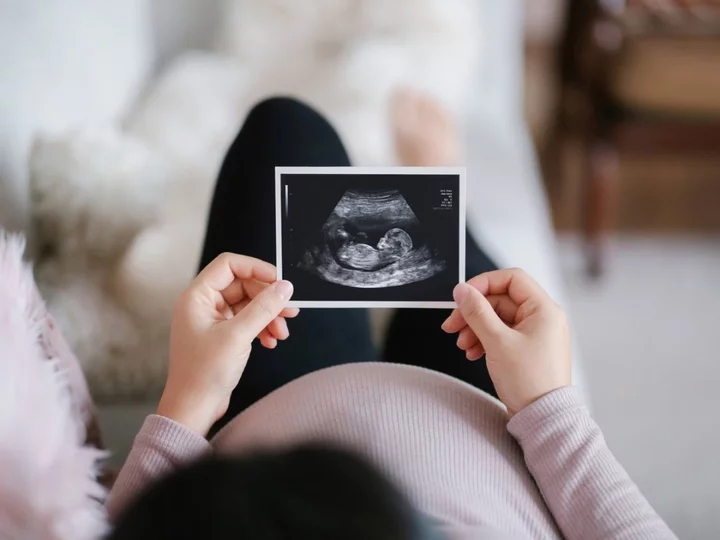
Who are the 82nd Airborne Chorus? Army band's tribute to fallen soldiers with 'My Girl' leaves fans 'full of respect'
82nd Airborne Chorus, army band auditioning for 'AGT' Season 18, deeply moves fans with emotional tribute to Elijah Crawford and fallen soldiers
2023-07-12 05:47

Why Aren't Car Gas Tanks Always on the Same Side?
To annoy you? Possibly. For other good reasons, like keeping you alive? Also yes.
2023-07-12 05:27

Kim Kardashian in talks to buy back beauty firm stake from Coty - WSJ
(Reuters) -Kim Kardashian is in talks with Coty to buy back a minority stake in her beauty firm from the
2023-07-12 05:26

Tennis star Naomi Osaka welcomes baby girl with boyfriend Cordae
Naomi Osaka has welcomed a baby girl with rapper boyfriend Cordae. The 25-year-old tennis star welcomed her first child in Los Angeles, People reported on Tuesday 11 July. “They are doing well,” a source told the outlet. The couple, who have been dating since 2019, announced they were expecting their first child together in January. “Can’t wait to get back on the court but here’s a little life update for 2023,” Osaka captioned an Instagram post, which featured a photo of the baby’s ultrasound. In June, the four-time grand slam champion revealed on Instagram that she was expecting a baby girl. Osaka shared several photos from the princess-themed baby shower, which included a large sign with the words: “A Little Princess Is on the Way” Another photo showed the “Doomsday” rapper kissing Osaka’s growing baby bump. The pro athlete simply captioned the post with a purple and white heart emoji. Although Naomi Osaka is currently focused on being a mother, the former world number one tennis player still plans on returning to the court in 2024, after she had withdrawn from the Australian Open earlier this year. “The past few years have been interesting to say the least, but I find that it’s the most challenging times in life that may be the most fun,” she wrote in her pregnancy announcement. “These few months away from the sport has really given me a new love and appreciation or the game I’ve dedicated my life to,” Osaka continued. “I realise that life is so short and I don’t take any moments for granted, everyday is a new blessing and adventure. I know that I have so much to look forward to in the future, one thing I’m looking forward to is for my kid to watch one of my matches and tell someone, ‘that’s my mom’.” “2023 will be a year that’ll be full of lessons for me and I hope I’ll see you guys in the start of the next one ‘cause I’ll be at Aus 2024,” she added, confirming her return to the 2024 Australian Open. “Love you all infinitely.” While the couple have not yet revealed the name of their newborn baby, Osaka previously hinted at some of her baby name choices. “We have been discussing names. I would say that we are going for something more unique than traditional,” she told People earlier this year. Throughout her pregnancy, the Japanese tennis player admitted that she was gearing up to become the “best version” of herself for her daughter. “I would say for me, I just want to be the best version of myself,” Osaka said. “Obviously, I’ve never been a mother before so I’m taking it day-by-day and just trying to be someone that my son or daughter will be proud of.” Read More Naomi Osaka announces pregnancy and will miss rest of 2023 tennis season Naomi Osaka says she's pregnant, plans tennis return in 2024 Serena Williams announces pregnancy and shows off baby bump at Met Gala Foetuses use ‘greedy’ father gene to get more nutrients from mothers, study finds The meaning behind the name of Carrie and Boris Johnson’s third child Emilia Clarke’s brain haemorrhage ‘profoundly changed our lives’, says star’s mother
2023-07-12 04:57

3 Mountains Taller Than Mount Everest
Mount Everest may seem like it's as tall and as high a mountain as has ever existed. But the title of Tallest Mountain all depends on how—and where—you make your measurements.
2023-07-12 04:45

Several shark species are facing extinction. Here's how you can help
Older than dinosaurs and trees, sharks have endured a lot throughout their 450 million years on Earth. They've even survived five mass extinctions, including the asteroid that wiped out 75% of life on the planet. But many species of these aquatic apex predators are now in danger of dying out forever.
2023-07-12 03:56

The Best Prime Day Deals on Echo Pop Smart Speakers, Fire Tablets, and Other Amazon Devices
With these Prime Day deals, you can save up to 55 percent on select Amazon devices, including Kindles, Luna wireless controllers, Ring video doorbells, and other top-rated finds.
2023-07-12 03:54

Unborn babies use ‘greedy’ father gene to get more nutrients from mothers, study finds
Unborn babies are in a perpetual nutritional tug-of-war with their mothers due to a “greedy” gene inherited from their fathers, a new study suggests. Scientists from the University of Cambridge have found that foetuses use the gene to “remote-control” their mother into feeding them extra food and control her metabolism. While the mother’s body wants the baby to survive, it needs to keep enough glucose and fats circulating in her system for her own health in order to be able to deliver the child, breastfeed, and reproduce again. Amanda Sferruzzi-Perri, professor in Foetal and Placental Physiology, a Fellow of St John’s College and co-senior author of the paper, said: “It’s the first direct evidence that a gene inherited from the father is signalling to the mother to divert nutrients to the foetus.” Dr Miguel Constancia, MRC investigator based at the Wellcome-MRC Institute of Metabolic Science and co-senior author of the paper, said: “The baby’s remote control system is operated by genes that can be switched on or off depending on whether they are a ‘dad’s’ or ‘mum’s’ gene’, the so-called imprinted genes. “Genes controlled by the father are ‘greedy’ and ‘selfish’ and will tend to manipulate maternal resources for the benefit of the foetuses, so to grow them big and fittest. “Although pregnancy is largely cooperative, there is a big arena for potential conflict between the mother and the baby, with imprinted genes and the placenta thought to play key roles.” The new study looked at how the placenta communicates with the mother through the release of hormones so she can accommodate her baby’s growth. In pregnant mice, scientists selectively altered the signalling cells in the placenta that tell mothers to allocate nutrients to her developing foetuses. The baby’s genes controlled by the father tend to promote foetal growth and those controlled by the mother tend to limit foetal growth, experts say. Professor Sferruzzi-Perri explained: “Those genes from the mother that limit foetal growth are thought to be a mother’s way of ensuring her survival, so she doesn’t have a baby that takes all the nutrients and is too big and challenging to birth. “The mother also has a chance of having subsequent pregnancies potentially with different males in the future to pass on her genes more widely.” In the study researchers deleted the expression of an important gene called Igf2, which provides instructions for making a protein called “Insulin Like Growth Factor Two”. Similar to the hormone insulin, which is responsible for making glucose and controlling its levels in our circulation, the gene promotes foetal growth and plays a key part in the development of tissues including the placenta, liver, and brain. Dr Jorge Lopez-Tello, a lead author of the study based at Cambridge’s department of physiology, development and neuroscience, said: “If the function of Igf2 from the father is switched off in signalling cells, the mother doesn’t make enough amounts of glucose and lipids – fats – available in her circulation. “These nutrients, therefore, reach the foetus in insufficient amounts and the foetus doesn’t grow properly.” The scientists found that deleting the gene also affects production of other hormones that modulate the way the mother’s pancreas produces insulin, and how her liver and other metabolic organs respond. Babies with Igf2 gene defects can be overgrown or growth-stunted. And the researchers say that until now, it was not known that part of the gene’s role is to regulate signalling to the mother to allocate nutrients to the unborn child. The mice studied were smaller at birth and their offspring showed early signs of diabetes and obesity in later life. Professor Sferruzzi-Perri said: “Our research highlights how important the controlled allocation of nutrients to the foetus is for the lifelong health of the offspring, and the direct role the placenta plays. “The placenta is an amazing organ. At the end of pregnancy, the placenta is delivered by the mother, but the memories of how the placenta was functioning leaves a lasting legacy on the way those foetal organs have developed and then how they’re going to function through life.” The findings are published in the Cell Metabolism journal. Reporting by PA Read More It took until my thirties to realise I might not be white Carrie Johnson announces birth of third child with Boris Johnson: ‘Guess which name my husband chose’ How many children does Boris Johnson have? The meaning behind the name of Carrie and Boris Johnson’s third child Emilia Clarke’s brain haemorrhage ‘profoundly changed our lives’, says star’s mother How many children does Boris Johnson have?
2023-07-11 23:21

Amazon Prime Day 2023 Has Arrived—and Here Are All the Best Deals on Headphones, Robot Vacuums, and More
These Amazon Prime Day 2023 deals can help you save big on top-rated products from Apple, iRobot, and other leading brands.
2023-07-11 23:18

Frank Alfred Odysseus: The meaning behind the name of Carrie and Boris Johnson’s third child
On Tuesday 11 July, Carrie Johnson announced that she and former prime minister Boris Johnson have welcomed their third child together. Frank Alfred Odysseus Johnson was born on 5 July ay 9.15am, Carrie revealed in an Instagram post before joking: “Can you guess which name my husband chose?” Much has already been made about the choice of names on social media, with people quick to point out that the former PM is a fan of the Greek poet Homer and his epic poem The Odyssey, which tells the story Odysseus. But what does the name – and the child’s other names – actually mean? Odysseus takes its moniker from Homer’s poem, which follows the legendary king of the island of Ithaca on his , who is returning home at the end of the 10-year Trojan War. His journey takes an additional 10 years, during which his crewmates perish and he must face a number of threats. In the poem, which covers a decade-long journey, Odysseus is portrayed as exceptionally intelligent and courageous. He is one of the most influential Greek mythology heroes and the name is often associated with wisdom, pride, and heroism. As for the newborn’s first and second names, Frank comes from the Medieval Latin term, “Francus”, which means “free, at liberty, and exempt from service”, according to etymonline.com. It’s also thought to be connected to the Old French word, “franc”, which, similarly, means “not servile”, with other associations including sincere, genuine, open, gracious, generous, worthy, noble, and illustrious. However, Merriam-Webster claims that the name Frank itself comes from the Franks, “a West Germanic people who lived long ago”. The dictionary continues: “In the early Middle Ages the Franks were in power in France. (It was from them that the country got its name, in Latin Francia.) “The Franks eventually merged with the earlier Gaulish and Roman inhabitants, and their name (Francus in Latin) lost its ethnic sense and referred to any inhabitant of Francia who was free, that is, not a slave or bondman.” As for Alfred, the name is believed to mean “elf counsel” and is derived from the Old English name, Ælfræd. It’s a name often associated with wisdom and is most commonly associated with famous Alfreds, including the ninth-century king, Alfred the Great, filmmaker Alfred Hitchcock, and the poet Lord Alfred Tennyson. In 2019, the former PM was accused of misquoting Lord Tennyson while discussing Brexit, pledgingthat Britain would leave the EU on 31 October “do or die, come what may”. The phrase is often linked to Tennyson’s poem, The Charge of the Light Brigade, except the quote is, “Theirs not to reason why, theirs but to do and die”. Read More Carrie Johnson announces birth of third child with Boris Johnson: ‘Guess which name my husband chose’ How many children does Boris Johnson have? Buckingham Palace responds to Joe Biden’s ‘protocol breach’ with King Charles Rishi Sunak to meet King Charles as Truss defends her record - live Johnson was ‘begging people for votes’ in a ‘demeaning’ way, says IDS Welcome, PM Sunak – the last best option to take over from Truss
2023-07-11 22:54

Emilia Clarke’s brain haemorrhage ‘profoundly changed our lives’, says star’s mother
Emilia Clarke’s mother has described how her daughter’s brain haemorrhage changed the Clarke family “in an instant”. Emilia, who played Daenerys Targaryen on Game Of Thrones, and her mother set up a brain injury charity after the star survived two life-threatening brain conditions while she was filming the hit TV show. Jenny Clarke said it feels like her daughter’s brain haemorrhage – a bleed on the brain – “feels like yesterday” even though it was more than a decade ago. The incident, which took place when Emilia was working out in a north London gym in 2011, was “completely out of the blue”, Jenny said. She said her daughter fought to stay conscious even though she was in “the worst pain she could ever imagine”. Emilia, now aged 36, was taken to a hospital in London but medics did not immediately spot that she had suffered a brain haemorrhage and it took “a long time” before she was sent to a specialist hospital where she received life-saving care, Jenny told the PA news agency. Jenny said there needs to be more awareness among medics about brain haemorrhages in young people because the condition is traditionally seen as something that happens to older people. Emilia also had to have a second procedure in 2013 where surgeons in New York had to remove a brain aneurysm which was found through routine check-ups. The Me Before You star and her mother have since set up the charity SameYou which is working to develop better recovery treatment for survivors of brain injury and stroke. Jenny, who is chief executive of the charity, said that rehabilitation after brain injury is “undervalued and under-prioritised” and should be a “key component of universal health coverage”. She said that while people with serious side effects of brain injury – such as mobility or speech and language problems – do get support, there is often little or no help for people who suffer mild to moderate problems. Jenny told PA: “It feels like yesterday to us really, because it was just such a profound shock. “She had just started Game Of Thrones, the first season had been filmed and she had just come back from a press tour. “And then she had her first brain haemorrhage which was completely out of the blue – it was a morning in March and she was in the gym and she suddenly felt this terrible pain in her head – she’s been quoted as saying it was the worst pain she could ever imagine. “She also realised that something was seriously wrong with her because the pain was so intense. “So she did her best, as she was lying semi-unconscious on the floor of the gym, to try and make sure she kept a sense of what was around her and she fought to make sure that she didn’t lose consciousness.” Jenny added: “When she was rushed to a hospital in London, it was very difficult to establish what has happened to her – and that’s also something that we think is very important; maybe there isn’t enough specialist information and training to actually recognise what happens when you have a brain haemorrhage when you’re young. “People expect people to have strokes and brain haemorrhages when they’re older, it’s a problem of older age, but Emilia was 23 when she had her first brain haemorrhage, so people didn’t recognise it as a brain haemorrhage. “So it took a long time before she was admitted to the wonderful Queen Square (the National Hospital for Neurology and Neurosurgery), which is part of University College London Hospitals and literally her life was saved because of an intervention to stop the bleeding. “But it was three weeks in hospital before we knew whether she was going to have another stroke, and whether she would have different health problems as a result of the brain haemorrhage.” Jenny continued: “When it comes completely out of the blue, your life is just changed in an instant. And I must say that our lives have been continuously changed because of it.” After describing the second “open head surgery” in the US, Jenny said: “Those two great big shocks really have profoundly changed all of us as a family.” The comments come as Jenny attended the launch of the World Health Organisation’s (WHO) Rehabilitation Alliance in Geneva – a coalition which is calling on countries to do more for people in need of rehabilitation services. Jenny delivered a speech to the WHO about the power of advocacy, saying: “There is huge power if survivors come together with one voice to demand that integrated rehabilitation is moved up the agenda. “One in three people will experience a brain injury. They are the most powerful advocates – and this meeting is calling for their needs to be heard and action to be taken.” On rehabilitation for brain injury survivors, she told PA: “As a young person… when something like this happens, you absolutely must have as much support as possible and it just doesn’t really exist. “If you have severe consequences of brain injury, of course, there are many places helping people if you’ve got strong long-term, serious conditions, but what we found was, is that you can have mild to moderate brain injury – and that means you don’t have any necessarily physical issues; you don’t have necessarily any speech and language difficulties, but you do always have the trauma that you’ve had the problem – and there is a just a huge lack of awareness that this is important enough to put resources to get it treated.” She added: “Rehabilitation is undervalued and under-prioritised and that’s clearly got to change as a key component of universal health coverage. “It was such a shock when it happened to us, when Emilia had her brain injury. “We’ve had thousands of people write to us, and so it’s not just our own lived experience, there’s just not enough provision, not enough services available. “There is a great unmet need and a gap in service provision after you’ve survived a brain injury, and you’re trying to rebuild your life, particularly if you’re a young adult. “And what we are advocating for is there needs to be a lot more information given to survivors of brain injury, about what’s happened to them and their opportunity to get recovery services. “There is a gap between what survivors and their families say they need and want and what is currently available in many developed countries.” Read More It took until my thirties to realise I might not be white Carrie Johnson announces birth of third child with Boris Johnson: ‘Guess which name my husband chose’ Buckingham Palace responds to Joe Biden’s ‘protocol breach’ with King Charles Charity boss speaks out over ‘traumatic’ encounter with royal aide Ukraine war’s heaviest fight rages in east - follow live
2023-07-11 22:21

What is ‘bed rotting’ and is it actually self-care?
With 3.2 million views of the TikTok tag ‘bed rotting’ and copious videos, it seems Gen Z are embracing a slower pace of life, with self-care happening in bed. Creators are sharing their morning routines and experiences of bed rotting for self-care, but the trend has come under fire for its potential health implications. Content creator Vanessa Hill describes it in her video as: “When you do literally nothing but laying in bed. It is the end of optimisation.” According to psychologist and The Beekeeper House founder and CEO Robert Common, “Bed rotting is the practice of spending an extended amount of time during your normal waking hours, or even a whole day, lying in bed. You could be watching films, scrolling on social media, talking on the phone, eating, or anything you would normally do if you were at home relaxing. “This differs from bed rest to recover from illness or injury, and is often used as a method of dealing with stress or anxiety, or as a self-care tool,” he explains. This is a shunning of hustle culture and productivity in the pursuit of self-care. “Although bed rotting might be the hottest self-care method trending on TikTok, the idea behind it isn’t new,” says Common. “People have been taking ‘duvet days’ for a long time now, and many companies even have policies around this, allowing staff an entitlement to several duvet days per year. “What we are seeing with this trend is more a case of social media driving conversations among young people. It could be especially appealing to Gen Zs, as many report feeling more stressed than other generations, so taking time away from it all to recuperate mentally could be especially appealing,” he explains. But, is it actually self-care or is it doing more harm than good? The benefits There are some positive aspects to this grimly named practice. “Taking some mental downtime to recharge has many benefits,” says Common. “We live in a very fast-paced world, so stepping back, reconnecting with yourself, recharging your batteries and rebuilding some mental and physical energy is always a positive thing to do. In fact, it’s something that more of us should be scheduling into our routines if we can. “Having this downtime puts us in a stronger position to reassess our goals and find the motivation to reach for them, manage our commitments and explore personal interests and hobbies without burning ourselves out,” he explains. Damage to mental health and physical wellbeing “Spending the odd day here and there throughout the month bed rotting is unlikely to do you any damage – quite the reverse. However, as with all things in life, balance is key,” explains Common. For example, “If bed rotting becomes a dominating factor or behaviour in how you spend your free time, this could be an indicator of depression or burnout. If you suspect you’re experiencing these – or other underlying health issues – it’s important to seek appropriate support to help identify the root causes, and find healthy ways to manage them,” he says. Other practices may be more beneficial. “Whilst rest is important for wellbeing, exercise is also a powerful tool for maintaining good mental and physical health, so ultimately, it’s about not being on either extreme of the spectrum.” Impact on sleep Bed rotting can impact the amount and the quality of sleep you get, too. “An important factor of good sleep hygiene is reserving your bed for sleeping only,” Common says. “Watching Netflix, scrolling on your phone and eating are some of the most obvious activities that go hand-in-hand with bed rotting, but it can make it harder to follow a good sleep schedule. “It’s also important to expend enough energy during the day to fall asleep on time, and maximise the benefits that come with proper sleep,” he says. So, while a few duvet days here and there could be counted as self-care, bed rotting too often may leave you worn out and unhappy. Read More Charity boss speaks out over ‘traumatic’ encounter with royal aide Ukraine war’s heaviest fight rages in east - follow live Beekeeping has gone viral – but how easy is it? Women in certain professions ‘may be at higher risk of ovarian cancer’ – study Everything you need to know about sleep in pregnancy
2023-07-11 21:52
